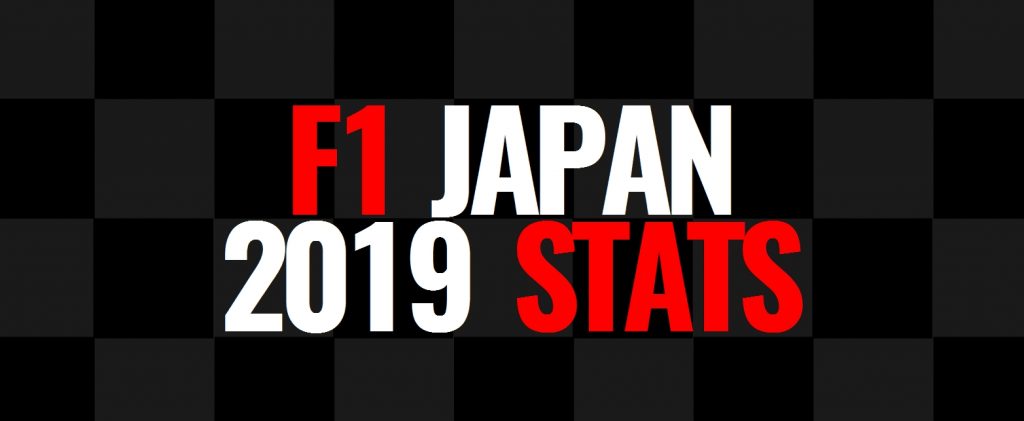Mercedes become six time champions, Albon records a career-best result and Bottas records the first Suzuka win from the second row of the grid. Here are all the facts and statistics from the 2019 Japanese Grand Prix weekend!
MERCEDES ARE CHAMPIONS
Mercedes recorded their 99th win in Formula 1 and with it became the fifth team to have claimed six Constructors’ Championships. They’re also only the second team to have taken six titles consecutively, the first team to do so since Ferrari achieved the feat between 1999 and 2004. The race result meant that only Lewis Hamilton or Valtteri Bottas can win the 2019 World Championship, ensuring that Mercedes will become the first team in history to win six consecutive Drivers’ and Constructors’ titles.
Mercedes have now won every Japanese Grand Prix since 2014, making Suzuka the fifth track at which they have won six or more times. With their win, Mercedes also became the engine manufacturer with the most victories at the track, having previously been tied with Renault.
Valtteri Bottas recorded the sixth win of his career at the 2019 Japanese Grand Prix. It was his third win of the 2019 season and the first win for a Finnish driver at Suzuka since Kimi Raikkonen won in 2005. Bottas now has the same win tally as Tony Brooks, John Surtees, Jochen Rindt, Gilles Villeneuve, Jacques Laffite, Riccardo Patrese and Ralf Schumacher. It was also his 43rd podium finish, equalling Jackie Stewart for eighteenth in the all-time list. The race was also Bottas’ 100th finish inside the points, making him the fourteenth driver to have scored points at 100 Grands Prix.
As Valtteri Bottas became the sixteenth different driver to have won the Japanese Grand Prix at Suzuka, he also became the first driver to do so having started from the second row of the grid. It’s only the fifth time that a Grand Prix at this track has been won away from the front row, and the first time since Fernando Alonso won from fifth on the grid in 2006.
Lewis Hamilton finished third in the Japanese Grand Prix, recording his 148th podium finish. It puts him seven top three finishes away from equalling the all-time record of most Formula 1 podiums. It was Hamilton’s seventh podium at the track.
Both the Track Record and Lap Record were beaten on Suzuka’s Super Sunday. In the race, Lewis Hamilton beat Kimi Raikkonen’s 2005 Lap Record record by 0.557 seconds. With the fastest lap, Hamilton equalled Michael Schumacher’s tally of most fastest laps at the Japanese Grand Prix (though only three of Hamilton’s have been set at Suzuka, compared to Schuamcher’s four). He also equalled Raikkonen for the second-most fastest laps in Formula 1, but is still 31 away from equalling Schumacher’s record!
Lewis Hamilton recorded his worst qualifying position of the season with fourth place on the grid. It’s the first time he’s qualified outside of the top three since the 2018 German Grand Prix, and the first time he has qualified outside the top three without a car issue since last year’s Canadian Grand Prix.
FIVE FERRARI POLES IN A ROW
Sebastian Vettel recorded the 57th pole position of his career. It was his fifth pole at Suzuka, making this the second circuit, after Circuit Gilles Villeneuve in Montreal, where Vettel has taken five poles. Vettel also became the first non-Mercedes driver to start from pole at Suzuka since Mark Webber with Red Bull in 2013. It was the seventeenth time that a German driver has taken pole position at Suzuka.
Vettel was unable to go on to win the Japanese Grand Prix from pole, but recorded his 119th podium finish. It was his eighth podium finish at Suzuka, putting him one away from Michael Schumacher’s record of top three finishes at the track. It was the first podium for a Ferrari driver in Japan since 2015.
Ferrari locked out the front row at Suzuka for the first time since 2006. It’s their third front row lock-out at the track and they become the first team to reach ten pole positions at Suzuka. It was also the first time no Mercedes driver has appeared on the front row of the grid for the Japanese Grand Prix since 2013.
Ferrari started from pole for a fifth consecutive race, making this the 35th occasion in F1 history that a team have taken five or more successive poles. It’s only the seventh time that Ferrari have done so in their history. They most recently secured five consecutive pole positions at the 2007 Bahrain Grand Prix. Ferrari have now taken as many poles this year as Mercedes.
HONDA’S HOME POINTS
Max Verstappen recorded Red Bull’s first retirement at Suzuka since David Coulthard failed to finish in 2006. On the other side of the Red Bull garage, Alex Albon recorded a career-best fourth place, marking the first time that a Honda-powered car has scored at Suzuka since Jenson Button finished fourth in 2006. Albon equalled the best result for a Thai driver in Formula 1; Prince Bira finished fourth in the 1950 Swiss Grand Prix and the 1954 French Grand Prix. With Pierre Gasly finishing eighth for Toro Rosso, this is the first Japanese Grand Prix in which two Honda-powered cars have scored since 2004.
QUALIFYING STATS
Williams recorded their first double Q1 elimination at Suzuka, while Renault are still yet to appear in Q3 at the track since their return to the sport.
Both Daniel Ricciardo and Kevin Magnussen recorded their second Q1 exits at Suzuka and their second Q1 exits of the 2019 season.
Pierre Gasly reached Q3 for first time since being demoted from Red Bull. It marked the first time he’s qualified in the top ten with Toro Rosso since the 2018 Brazilian Grand Prix and also marked the team’s fourth Q3 appearance at the Suzuka circuit.
TEAM POINTS
With an impressive drive to fifth place for Carlos Sainz, McLaren recorded their first points at Suzuka since Jenson Button also finished fifth in 2014. Pierre Gasly’s eighth place also marked the first points at the track for Toro Rosso since 2015.
Racing Point (formerly Force India) scored their least amount of points at the track since 2013, but maintained their streak of points finishes in the Japanese Grand Prix which goes back to 2014.
TYPHOON HAGIBIS
Due to Typhoon Hagibis, qualifying was rescheduled to Sunday morning. It’s the fifth time that has happened this millennium, the other times being at the 2004 and 2010 Japanese Grands Prix, the 2013 Australian Grand Prix and the 2015 United States Grand Prix.
As a result of a technical error, the chequered flag was shown a lap early, meaning that only 52 laps of the race counted toward the final result. As a consequence, the 2019 Japanese Grand Prix becomes the shortest F1 race on record at Suzuka; the 2019 event being two minutes and six seconds shorter than the 2006 race.




